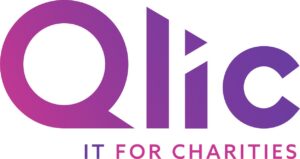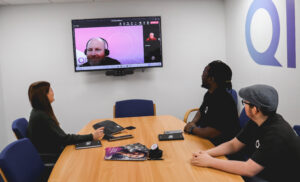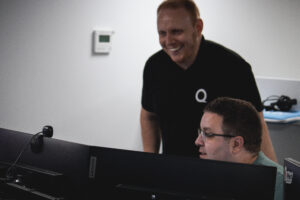As we navigate through the rapidly evolving digital landscape, the importance of data protection and cybersecurity has never been more critical. The introduction of the General Data Protection Regulation (GDPR) in May 2018 has significantly reshaped how organisations handle data on a large scale. Charities are no exception. It ensures organisations and charities collect, store and process personal data in a safe and transparent way.
We will examine how this regulation has impacted how charities store and process sensitive data and what measures should be put in place to ensure charity data remains secure from cyber threats at all times. So if you are wondering, “Why is cyber security important for charities?” you’ll learn below how it can have knock-on effects on data protection and GDPR compliance. By having a proper understanding of data management best practices and the right IT solutions in place, GDPR compliance, data protection and charities should have a successful symbiotic relationship.

Understanding GDPR and Its Impact on Charities
The General Data Protection Regulation (GDPR) was designed to regulate data protection and privacy standards across the EU and has had a profound impact on the charity sector. The regulation’s primary objective is to provide individuals with more control over their personal data. As charities handle sensitive data from donors and beneficiaries, they have a legal obligation to adhere to GDPR. However, it also offers an opportunity for charities to increase trust with donors by offering complete transparency.
Furthermore, GDPR applies directly to charitable fundraising. With GDPR, the most appropriate data process depends on the specific circumstances. These include the nature of the work, the types of data involved, and the relationship between the charity and the individual.
Understanding GDPR is crucial for charities. It guides you on the nature of data you collect, and how it should be managed and protected. This in turn shapes charity relationships with donors, volunteers, and beneficiaries.
Fines For Data Breaches
In an era where data breaches are increasingly common, the importance of abiding by data protection laws cannot be overstated. Non-compliance can lead to serious consequences, including substantial fines. The Information Commissioner’s Office (ICO), has a range of tools to enforce GDPR. These include assessment notices, warnings, reprimands, enforcement notices, and penalty notices. The ICO can issue fines of up to £17.5 million or 4% of an organisation’s annual worldwide turnover for serious breaches.
Non-compliance can also draw negative attention to your charity, damaging your reputation and donor trust. Therefore, it’s essential for nonprofits to understand their obligations under data protection laws. One example of an organisation that was heavily fined for non-compliance of GDPR is British Airways. They were fined a total of £20 million for failing to protect the personal and credential details of their 400,000 loyal customers.
Data Protection Principles for Charities
There are several GDPR principles that relate to the nonprofit sector. These include lawfulness, fairness and transparency, purpose limitation, data minimisation, accuracy, storage limitation, integrity and confidentiality, and accountability.
One of the key principles is data minimisation. This means charities should only collect the data that is absolutely necessary for their operations. For example, a charity might only need a donor’s name, contact details, and donation amount, rather than additional unnecessary information.
Consent is another crucial principle of GDPR. This requires charities to obtain permission from donors before collecting and using their data. This can be achieved through consent forms informing them of how the data will be used.
There must also be robust processing of personal data in place. This is in order to maintain the accuracy of data, securely store it for no longer than necessary, and protect it from unauthorised access or loss. This links to another principle, accountability. This can be achieved by maintaining comprehensive records of data processing activities, implementing data protection policies, or appointing a Data Controller, Data Protection Officer or other Data Processors if necessary.
The Role of IT Solutions in Ensuring Compliance
IT solutions help to achieve and maintain GDPR compliance, as well as adhering to data protection for charities. Cyber security is highly important for charities. Let’s take a look at how IT solutions simplify general data protection regulation compliance and data protection:
Data Encryption
IT solutions provide strong encryption methods to protect sensitive data, ensuring that even if data is intercepted, it cannot be read without the correct decryption key. There are many Sophos solutions to help encrypt your data.
Access Controls
Some IT systems allow for granular access controls, ensuring that only authorised individuals can access certain data based on their role and need-to-know basis. Microsoft InTune is a great example of this.
User Authentication
Multi-factor authentication (MFA) adds an extra layer of security that requires authentication from the user through at least two forms. This can either be through an app notification or a one-time passcode.
Data Masking and Anonymisation
These tools are great at hiding sensitive data within data stores, another IT solution that ensures privacy by replacing real values with substitutes.
Data Backup and Recovery
Ensuring regular data backups and recovery options are practised is crucial in case of data loss. This ensures the confidential principle of GDPR and allows for ultimate data protection. A great example of this is Datto Backupify.
Data Portability
Lots of IT platforms can facilitate data portability, which allows individuals to obtain and reuse their personal data across different services as required by GDPR.
Auditing and Logging
IT systems can track all data input or output activities and generate logs based on this. This really helps to aid the auditing process and provide evidence of compliance.
Data Classification and Mapping
Data classification and mapping can help to create a data flow solution, which is essential for GDPR compliance.
Incident Detection and Response
IT systems can help detect potential data breaches and respond promptly, mitigating risks and reducing damage. A great example of this is Sophos Managed Detection and Response.
Consent Management
Organisations can use tools to manage donors’ consent preferences, ensuring that data processing activities align with their given choices.
Automated Compliance Checks
IT can also help to automate compliance checks. This will in essence identify any non-compliance issues and provide recommendations.
Vendor Management
Vendor management can be completed through software to assess GDPR compliance of the vendors.
Privacy Impact Assessments (PIAs)
IT tools can automate PIAs, identifying and reducing the privacy risks of projects.
Training and Awareness
There are lots of training and awareness platforms available that can deliver GDPR training to staff. Proofpoint has some great GDPR compliance and data protection for charities training resources. It is also worth looking at cyber security training for charities as this covers data protection as well.
Reporting and Documentation
Comprehensive reports can be generated and maintained along with essential documentation, demonstrating compliance with GDPR.

Choosing the Right IT Solution Partner
There are a range of IT solutions that can help to simplify and ensure GDPR compliance and data protection. This heightens the need to work with an IT solution provider who is experienced in serving charitable organisations.
At Qlic IT, we’ve had the opportunity to work with hundreds of nonprofit organisations over the last two decades. We have helped to improve the cyber security charity landscape by putting into place processes and training to help them get up to scratch with GDPR and data protection.
Oasis Domestic Abuse is a perfect example of one of our charity cyber security case studies where we successfully improved their cyber security environment. Oasis didn’t have much cyber security software in place, which put their confidential data at risk. We implemented several key pieces of software, including Sophos UTM (Unified Threat Management) and Cyber Essentials, a government-backed initiative.
Closing remarks
In today’s digital age, data protection for charities and GDPR compliance has become a legal obligation. Through the use of IT solutions, nonprofits can effectively implement data encryption, access controls, user authentication, and much more that are essential for data protection.
Working with an IT solutions partner can significantly simplify this process. Leveraging IT and partnering with experts can help nonprofits secure their data and maintain regulatory compliance.
Free Cyber Security Consultation
Are you looking for a trustworthy IT solutions specialist to help protect your charity’s data? Book your free Cyber Security Consultation below!






